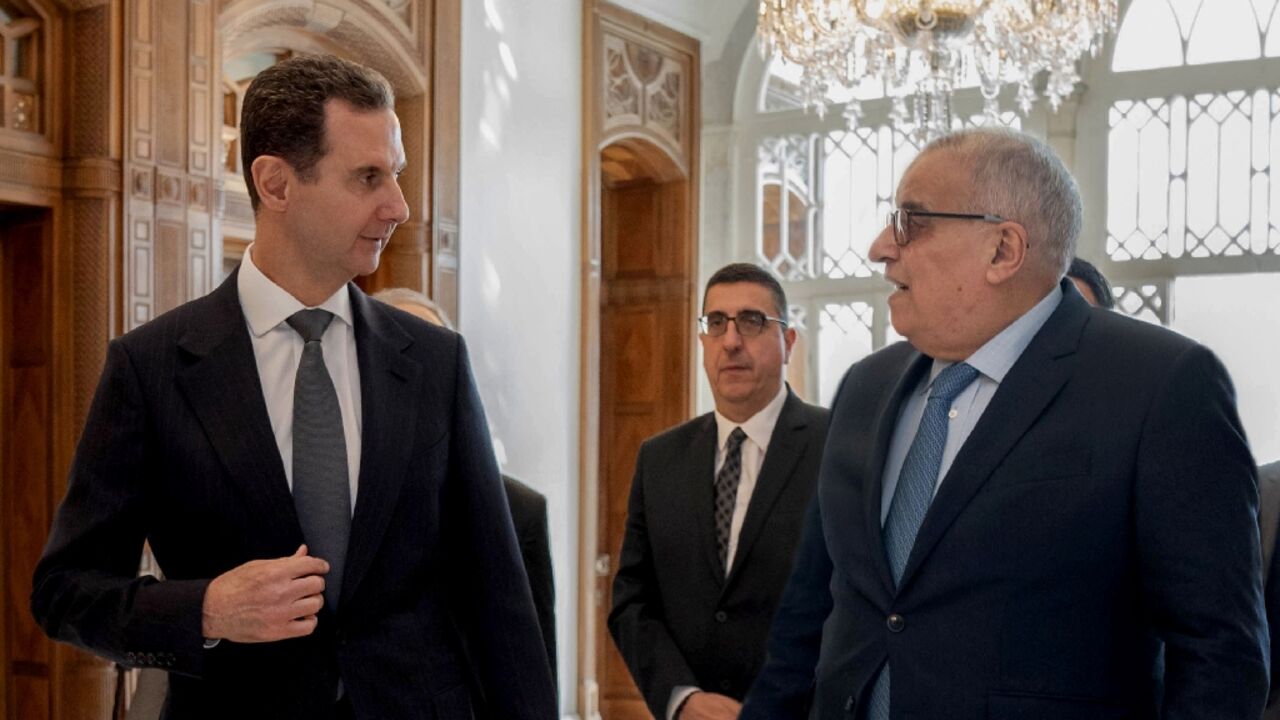'Opportunity' for Syria's Assad in quake outreach, analysts say

Syria's politically isolated President Bashar al-Assad has received calls and aid from Arab leaders since a devastating earthquake Monday, a momentum analysts say he could leverage to bolster regional support.
The 7.8-magnitude pre-dawn quake has killed more than 16,000 people in Turkey and neighbouring Syria, already reeling from over a decade of conflict and years of economic sanctions.
Nicholas Heras of the New Lines Institute of Strategy and Policy said mobilisation to help quake victims offers Assad an opportunity to restore ties with some Arab countries, but "this humanitarian crisis will not exonerate his regime in Western states".
"The horrible tragedy that has struck Syria and Turkey is a clear opportunity for Bashar al-Assad to try to advance the slow-moving... process of normalising his regime again with the rest of the Arab world," Heras told AFP.
The Syrian president on Tuesday received a call from his Egyptian counterpart offering support, their first official exchange since Abdel Fattah al-Sisi assumed office in 2014.
While Cairo and Damascus have maintained relations during the 12-year war, the Arab League suspended Syria in 2011 and some other Arab countries have severed ties with it.
The ruler of Bahrain, which re-established diplomatic relations with Syria in 2018, called Assad on Monday, their first official conversation in more than a decade.
The United Arab Emirates -- the first Gulf country to normalise ties with the Assad regime after years of boycott -- is spearheading regional relief efforts.
Abu Dhabi has already pledged at least $50 million in assistance and sent several aid planes a day since the quake.
Lebanon, which has adopted a policy of dissociation, sent on Wednesday its first high-level official delegation to Damascus since the start of the conflict.
- 'Use the moment' -
Relief efforts could pave the way for "a clear and open channel for sustained diplomatic engagement", Heras said.
But Aron Lund of Century International think tank said the messages of support were "routine... after a major natural disaster".
"We'll have to wait and see," the Syria expert told AFP. "Will there be more of these contacts, and will they be sustained beyond the immediate crisis?"
"The crisis may lower the threshold for bilateral contacts" between Damascus and Arab states that have so far been reluctant to normalise ties, he added. "Assad will try to use the moment."
Saudi Arabia, which severed ties with the Assad regime in 2012 and had backed Syrian rebels in earlier stages of the war, has pledged aid to both rebel-held and government-controlled parts of the country.
Saudi aid will go directly to Aleppo's government-controlled international airport as well as the Damascus-based Syrian Red Crescent, but there was no direct contact with the Assad government, an official at King Salman Humanitarian Aid and Relief Centre told AFP.
Qatar, accused of funding rebels, has also swiftly pledged assistance despite no formal ties.
The earthquake could particularly strengthen Syria's ties with rebel-backer Ankara, which have warmed in the months leading up to the quake, Lund said.
"Both countries now share a problem that goes beyond borders and political disagreements."
- Western aid -
The Assad government has long branded the bloody conflict as a ploy by Western states, and blames crippling Western sanctions for a spiralling economic crisis.
But that has not stopped Syria's outreach efforts after the earthquake.
Foreign Minister Faisal Mekdad said on Monday his government was ready "to provide all the required facilities" for international organisations to send aid.
And Bassam Sabbagh, Syria's UN envoy, announced it would accept assistance from any country.
The Syrian Red Crescent has called on the United States Agency for International Development (USAID) to help, and an EU official said Syria has even made an official plea to the bloc.
Janez Lenarcic, the EU's commissioner for crisis management, said on Wednesday the European Commission is "encouraging" member states to respond to Syria's request for medical supplies and food, but would also closely monitor aid to ensure "it is not diverted" by the sanctioned government in Damascus.
For its part, the United States said Tuesday it was working with partners to provide relief but would stand firm against working with the Damascus government.
"Funds, of course, go to the Syrian people -- not to the regime. That won't change," Secretary of State Antony Blinken told reporters.






